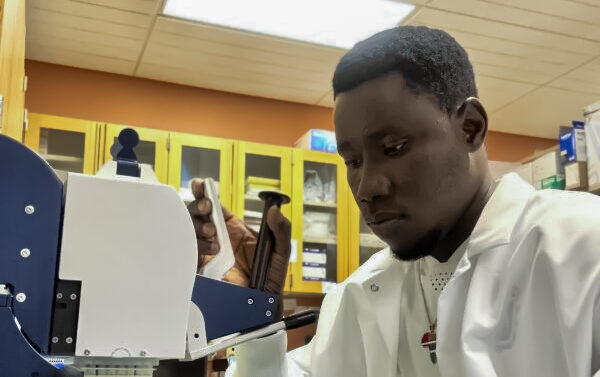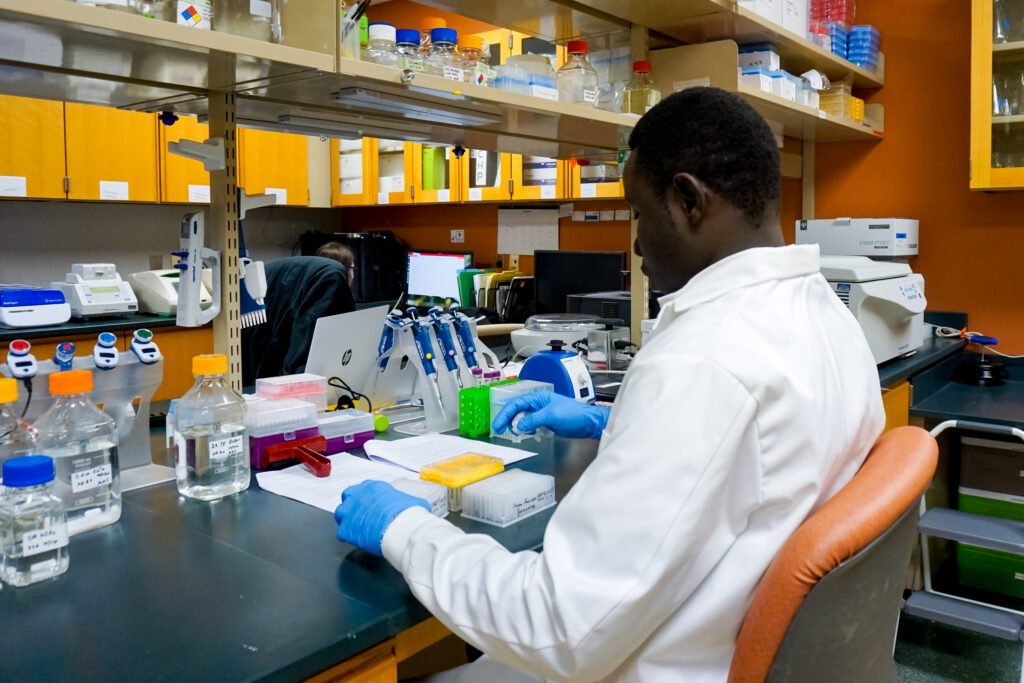
Alhagie Cham, an accomplished scientist from Gambia, West Africa, developed his passion for agriculture from humble beginnings in a groundnut-growing family. Cham’s passion for agriculture led him to pursue academic excellence. Cham currently serves as a postdoctoral research associate in the Olukolu Lab at the Department of Entomology and Plant Pathology. With a focus on bioinformatics, genomics, and molecular interactions, Cham aims to understand the dynamics of plant-pathogen-microbe interactions within agricultural systems.
Q&A with Alhagie Cham
Can you tell us a little bit about yourself?
My name is Alhagie K. Cham, and I am from Gambia, West Africa. I obtained a BS degree in agronomy at the University of Ciego de Avila, Cuba, an MS degree in entomology and biological control at the Autonomous University of Nayarit, Mexico, and a PhD in agricultural science at the Autonomous University of Nuevo Leon, Monterrey.
Who are the team of faculty you work with?
I am a postdoctoral research associate in Dr. Bode Olukolu’s Lab at the Department of Entomology and Plant Pathology. My research efforts and experience have been enriched by a team of people with diverse skill sets and backgrounds, including the newly minted Dr. Alison Adams (Genome Science and Technology), faculty members at the University of Tennessee, Knoxville, and other institutions.
What are your primary research areas performed in the lab?
My research interests in bioinformatics, genomics, and molecular interactions aim to understand the complex plant-pathogen-microbe interactions within the context of agricultural systems. Biological questions driving my research include:
- How does the host-associated metagenome modulate pathogenesis, plant defense response, and immunity?
- By accounting for the role of microbes in host phenotypic expression, can we improve statistical power to identify genes and improve genomic predictions?
- Can selection during breeding enrich alleles underlying the efficient recruitment of beneficial microbes, hence, making crops more resilient across diverse environments?
- Can low-level constitutive expression of the plant defense response drive robust disease resistance without the associated penalty yield?

How did you get into your career field?
My interest in agriculture started during my childhood, when my father grew groundnuts. I started my career in science after being awarded a scholarship to study agronomy in Cuba. After spending six years in Cuba and becoming fluent in Spanish, I graduated in 2015 with BS Honors in Agronomy. I returned to Gambia where I worked as a research officer at the National Agricultural Research Institute (NARI) for a year and six months. Afterward, I received a Mexican Government Scholarship for my graduate studies.
What is your favorite procedure to do in the lab?
I find wet lab work to be my favorite research activity, and even when things do not work out right, I enjoy the process of troubleshooting.
What do you consider to be one of your greatest achievements? Why?
Considering no one else in my family had a university education, the opportunity to obtain a university education is one of my greatest achievements.
If someone wanted to get to where you are now, do you have any advice for them?
Considering my humble beginning, my advice to anyone is to never stop aiming big and always follow your dreams.
What are two of your favorite hobbies?
I enjoy playing and watching soccer, and spending time with family and friends. It is always nice to have a good laugh and have someone to talk to about the good and tough times. I have found support in family, friends, and sometimes complete strangers, so I’m always open to returning the favor.
